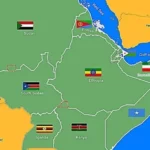Summary and Additional Remarks by News About Turkey (NAT)
The article delves into the complex dynamics between Turkey and Egypt, two powerful Sunni Muslim nations in the Mediterranean region, as they work to mend their fractured relationship. This rapprochement, which gained momentum after more than a decade of hostility stemming from their opposing roles during the Arab uprisings, has been largely transactional. Both nations see mutual economic benefits and regional security as key priorities, with Libya emerging as a central focus for cooperation. However, their entrenched rivalries and conflicting stakes in Libya’s ongoing conflict reveal deep-seated challenges that could undermine their efforts.
Turkey and Egypt’s relationship was significantly strained following the 2011 Arab Spring, during which Turkey supported Islamist-leaning movements, while Egypt, particularly under Abdel Fattah al-Sisi’s leadership, adopted an anti-Islamist stance. This division manifested starkly in Libya’s civil war. Turkey aligned itself with the internationally recognized Government of National Unity (GNU) in Tripoli, deploying military aid, combat drones, and personnel to push back General Khalifa Haftar’s forces, who were supported by Egypt, Russia, and other regional players. While Turkey’s intervention helped establish a ceasefire in 2020, it also cemented its influence in western Libya. Conversely, Egypt maintains strong ties to Haftar, whose eastern administration controls Libya’s border regions with Egypt and receives substantial military support from Cairo.
Efforts to repair relations between Turkey and Egypt have been driven by shared economic interests, as both nations struggle with high inflation and seek to boost trade and investment. In 2024, this renewed engagement culminated in Turkish President Recep Tayyip Erdoğan’s historic visit to Cairo, marking his first trip to Egypt in over a decade. The visit was symbolically and strategically significant. For Egypt, hosting Erdoğan bolstered its regional standing, particularly in the context of the Gaza war. For Turkey, the visit reinforced its influence in the Middle East and opened channels for lucrative reconstruction contracts in Gaza. Trade agreements, including a target to raise bilateral trade to $15 billion, and Turkey’s sale of Bayraktar drones to Egypt further underscored the transactional nature of their reconciliation.
Despite these developments, longstanding flashpoints remain unresolved. One major point of contention is the maritime boundary dispute in the Eastern Mediterranean. Turkey’s energy exploration activities in contested waters have drawn Egypt into alignment with Greece, further deepening tensions. In Libya, their opposing roles persist, as demonstrated by Turkey’s recent memorandum of understanding with the GNU, which grants Turkish forces legal immunity and unrestricted access to Libya’s airspace, territory, and waters. This agreement has heightened Egyptian concerns, as Cairo ultimately seeks to curtail Turkey’s military presence in Libya.
Complicating matters further is Russia’s involvement in Libya. General Haftar’s forces are heavily supported by Moscow, with the Wagner Group playing a critical role in military operations. This dynamic links Libya’s conflict to broader geopolitical tensions, particularly between NATO and Russia. For Turkey, balancing its military and economic commitments in Libya with its relationship with Russia presents a delicate challenge. Any direct conflict between Turkish-backed forces and Russian proxies in Libya could have significant implications for NATO and stability in the Mediterranean.
The Libyan conflict itself remains deeply rooted in economic rivalries, with competing factions vying for control of the country’s vast oil revenues and financial resources. This elite competition, involving ruling families and their networks, reflects the broader challenges of governance and stability in Libya. Recent clashes, institutional power struggles, and militia mobilizations have further destabilized the country, raising the risk of a breakdown in the fragile ceasefire established in 2020.
While Turkey and Egypt’s rapprochement offers potential for greater cooperation in the region, their conflicting interests and the volatile situation in Libya suggest that meaningful progress will be difficult to achieve. The shifting alliances and external influences, particularly from Russia, highlight the complexity of the Libyan conflict and the limits of regional power dynamics. As the situation in Libya continues to evolve, the fragile reconciliation between Turkey and Egypt faces significant tests, with the potential for renewed discord or, alternatively, a redefined approach to their engagement in the region.
Read more here.



